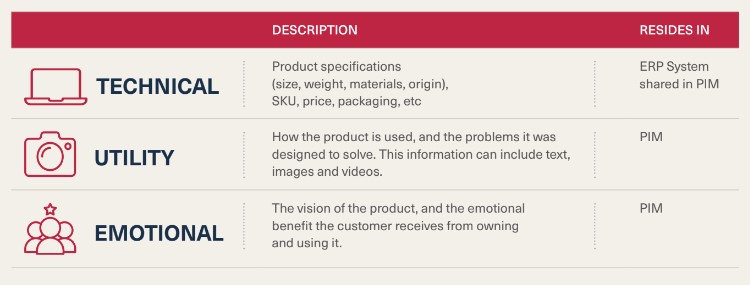
What is PIM and why should you care?
A curious thing has happened in the eCommerce space. Out-of-the-box platforms like Shopify and BigCommerce make launching an eCommerce store a quick and easy process. Entrepreneurs can literally buy a license and open a store in a matter of days. And they do! While it’s difficult to pinpoint how many eCommerce sites exist in the world, estimates range from 12 million to 24 million. That’s a lot of competition. But opening a store and providing visitors the insight and information they need to make the right purchasing decision for their needs are two different things. One way to make your brand stand from millions of other stores is to present consumers with the information they need to make the right decisions at the right place and the right time. That’s where product information management (PIM) systems come into play.
PIM: your e-commerce website’s best friend
PIM systems are tools that help your company tell its prospects and customers great stories about the products in your catalog. They provide structure for all of the information the people within your organization created in order to promote and market your products. PIM systems were designed to solve the challenges of selling products across multiple channels, including those owned by third-parties.
But wait, you may say. Isn’t that what our ERP system does? The answer is both yes and no. The ERP system is designed to house product specs and pricing information. But what about the FAQ your customer care team created to help customers install or assemble the products they purchase? What about the testimonials from customers who are super fans of your brand? There’s myriad types of information consumers need to make a purchasing decision — information that various teams within your company go to great lengths to create. PIM allows you to deploy that info across all of your digital touchpoints, whether that’s onsite, on social media, your Amazon store or other affiliate partnerships.
Multiple types of product data. Multiple places to store it.
Here’s a simple way to think about the differences between PIM and ERP systems: PIM systems focus on centralizing and managing a wide range of product information that customers engage with while they’re in product discovery mode. ERP systems are designed to share and integrate information into the broader business systems, such as your company’s CRM, accounting and inventory systems.
How typical product information is stored (some use cases may be different):

A $12.8 Billion Industry
The global product information management (PIM) market is a fast growing sector. In 2021, the market was valued at $12.8 billion. By 2030, it will top $68.1 billion, growing at an impressive CAG of 20%. That growth says a lot about the competitive advantage PIM systems offer eCommerce brands eager to grow and thrive.
Why should you care? It’s really simple: your catalog drives the show. PIM systems are problem solvers, especially for retailers and eCommerce sites that have extensive catalogs or global audiences. These tools help you to:
- Streamline the creation, approval and distribution of information workflows
- Bring much-needed rigor to the product data consumers and purchases interact with throughout the digital universe
- Assess the quality of product data wherever it exists in the digital universe
- Pinpoint where product information falls short and requires updating
As a result, PIM systems help organizations optimize every step of the consumer journey, ensuring that consumers have the information they need at the right moment in time, whether that’s text, PDFs, images or how-to-video.
Learn More: download our eBook
In a highly competitive eCommerce environment, succinct and easily available product information is a key differentiator. But how do you go about selecting a PIM system that’s right for you? What is the implementation cycle like? And how can you leverage it across every touchpoint? These are excellent questions that we address in our free eBook: PIM: Your catalog drives the show.



